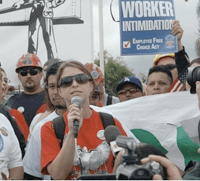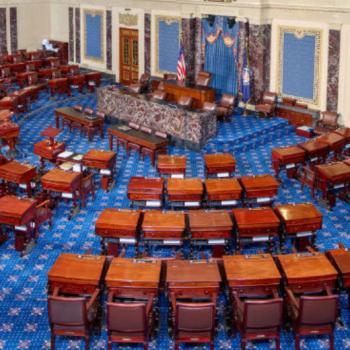By: Rabbi Alison Abrams - May 25 2009
 From a Jewish perspective, considerations about the meaning of existence find an organizing principle in the Covenant. As we approach Shavuot1, it is timely to ask what it means to be part of a covenantal relationship and how that creates meaning in our lives. The concept of covenant assumes that we live in relationship, both with God and with the rest of God's creation. Simply put, the meaning to our existence lays in being God's partner in a holy relationship. Our lives are infused with a sense of power and urgency when we understand that God's work cannot be done without our participation. Our participation is called by many names - commandment, responsibility, or obligation. I believe our primary point of participation is serving as agents of justice. The work of justice is the work of God and by engaging in the realization of justice for all people, we provide meaning to our existence.
From a Jewish perspective, considerations about the meaning of existence find an organizing principle in the Covenant. As we approach Shavuot1, it is timely to ask what it means to be part of a covenantal relationship and how that creates meaning in our lives. The concept of covenant assumes that we live in relationship, both with God and with the rest of God's creation. Simply put, the meaning to our existence lays in being God's partner in a holy relationship. Our lives are infused with a sense of power and urgency when we understand that God's work cannot be done without our participation. Our participation is called by many names - commandment, responsibility, or obligation. I believe our primary point of participation is serving as agents of justice. The work of justice is the work of God and by engaging in the realization of justice for all people, we provide meaning to our existence.
The prophet Isaiah is one of the most vocal defenders of justice in our text and, like all the prophetic texts, Isaiah's message is one from God. Isaiah gives voice to God's desire for the people Israel and what is expected of them. Isaiah clearly lays out our charge as people existing in covenant:
Wash yourselves clean;
Put your evil doings
Away from my sight.
Cease to do evil;
Learn to do good.
Devote yourselves to justice;
Aid the oppressed.
Uphold the rights of the orphan;
Defend the cause of the widow.
(Isaiah 1.16-17)
Aside from the general notion that justice is a good thing, what is Isaiah telling us? What should we hear in his voice? First, in order to do what is right we need to sever ties with unjust behaviors, habits, and relationships. This involves self-reflection and evaluation. Then, we must learn - perhaps re-learn - to do what is good. In a world of greed, ignorance, and hatred, we strive to live based on the principals of community, compassion, and understanding. And then we move to action - "devote ourselves to justice." Devotion is an important concept for us, both in our religious lives and secular ones. We are devoted to our families, to our work, to God. Now we add justice to our list. The next three statements tell us what that means. Here we receive guidance in how to live a meaningful existence.
Aid the oppressed. There is much oppression in our world and we must assist those who are living under it. This is more difficult than it sounds because it asks us to stand in solidarity with people who may be outside our community who are struggling for rights and recognition that we already possess. The text does not say to aid the oppressed only if you are one of them.
Aid the oppressed. Stand with those who are experiencing the hardship of discrimination and fear even if we are living in relative comfort and security. Because, as Dr. Martin Luther King Jr. wrote in his Letter from a Birmingham Jail, "Injustice anywhere is a threat to justice everywhere."2
Uphold the rights of the orphan. The orphan is the most unprotected person in a society. The possibility of the orphan's rights to be violated is great, due to his life circumstances. Isaiah tells us that we are responsible for ensuring that the vulnerable among us are not abused nor their rights violated.
Defend the cause of the widow. The widow is the person who has lost much and whose voice is often ignored. The widow, in ancient texts, symbolizes the one without social power or standing, who can easily be taken advantage of. We must help her resist such a fate. When she cries out, we must cry with her. We can make certain that her voice is heard and her cause is addressed.
If we believe that our lives find substance through a covenant with God, then justice is the work we must do to uphold our end of that relationship. Rabbi Abraham Joshua Heschel wrote:
"People think that to be just is a virtue deserving honor and rewards, that in doing righteousness one confers a favor on society. No one expects to receive a reward for the habit of breathing. Justice is as much a necessity as breathing is and a constant occupation."3
As breath is necessary to existence, justice is necessary to a meaningful existence. By standing up and speaking out, we can participate in the creation of a world redeemed, imbuing our days with holiness and carrying out God's vision for our world.
Rabbi Alison Abrams grew up in the Chicago area and graduated from Smith College in 2002 with a B.A. in Women's Studies. In May 2008, she was ordained by Hebrew Union College-Jewish Institute of Religion in Los Angeles, California. Rabbi Abrams currently serves as the Director of Faith Community Outreach at Clergy and Laity United for Economic Justice (CLUE), organizing people of faith to respond to the crisis of working poverty in Los Angeles. Beginning July 1, she will be the assistant rabbi at Temple Chai in Long Grove, IL.
1 The Jewish holiday marking the giving of the Ten Commandments at Sinai.
2 "Letter from a Birmingham Jail," April 16, 1963.
3 The Prophets (New York: HarperCollins Publishers, 2001): 198-9.
1/1/2000 5:00:00 AM




